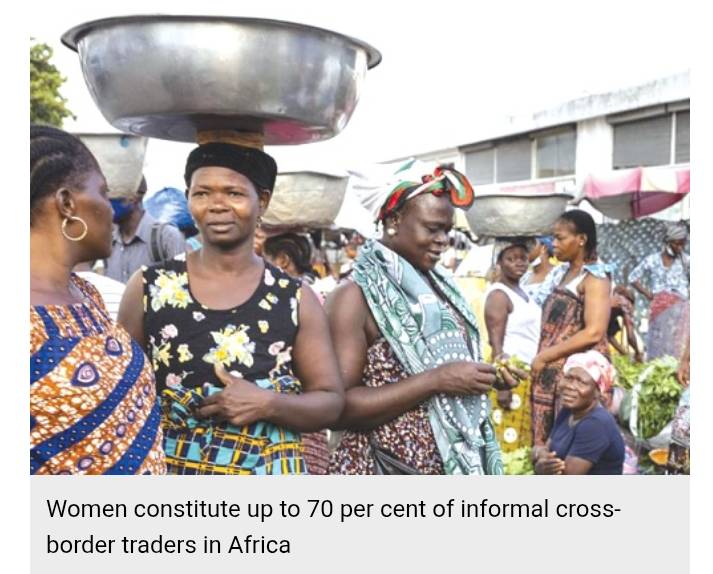Ghanaian women are transcending local marketplaces, emerging as pivotal players in regional trade.
From Accra to Aflao, Techiman to Tamale, these traders and entrepreneurs are venturing into neighbouring countries such as Togo, Nigeria and Côte d’Ivoire. Their cross-border endeavours are not only fueling commerce but also reshaping the economic landscape of West Africa.
Consider the journey of Esi Kumedzro, a 42-year-old businesswoman from Aflao. Thrice weekly, she travels to Lomé, Togo, procuring textiles and cosmetics for resale in Ghana.
"I began with just a few yards of fabric and a small bag of creams. Now, I import in bulk," Esi shares. "Togolese fabrics are highly sought after in Ghana, offering better profits than solely selling local prints."
Similarly, Abena Nyarko, 38, regards Lagos as her commercial hub. Biweekly, she embarks on a bus journey from Accra to Nigeria to source lace fabrics, handbags and accessories.
"Nigerian lace is essential for weddings and special events in Ghana. Customers favour it over local brands due to its superior quality," she explains.
Profit
Despite enduring long trips and customs delays, Abena remains steadfast. "Lagos boasts some of the finest lace markets in West Africa. Bulk purchases there yield substantial profits back home."
These narratives mirror the experiences of countless Ghanaian women engaged in cross-border trade.
GRAPHIC ONLINE
search_graphic_online
Women on the move: Breaking barriers, expanding markets
Delali Sika
Feb - 24 - 2025 , 09:57
5 minutes read
Women constitute up to 70 per cent of informal cross-border traders in Africa
Women constitute up to 70 per cent of informal cross-border traders in Africa
Advertisement
Get today's e-Paper on Graphic NewsPlus
Ghanaian women are transcending local marketplaces, emerging as pivotal players in regional trade.
From Accra to Aflao, Techiman to Tamale, these traders and entrepreneurs are venturing into neighbouring countries such as Togo, Nigeria and Côte d’Ivoire. Their cross-border endeavours are not only fueling commerce but also reshaping the economic landscape of West Africa.
Experiences
Consider the journey of Esi Kumedzro, a 42-year-old businesswoman from Aflao. Thrice weekly, she travels to Lomé, Togo, procuring textiles and cosmetics for resale in Ghana.
"I began with just a few yards of fabric and a small bag of creams. Now, I import in bulk," Esi shares. "Togolese fabrics are highly sought after in Ghana, offering better profits than solely selling local prints."
Advertisement
Similarly, Abena Nyarko, 38, regards Lagos as her commercial hub. Biweekly, she embarks on a bus journey from Accra to Nigeria to source lace fabrics, handbags and accessories.
"Nigerian lace is essential for weddings and special events in Ghana. Customers favour it over local brands due to its superior quality," she explains.
Profit
Despite enduring long trips and customs delays, Abena remains steadfast. "Lagos boasts some of the finest lace markets in West Africa. Bulk purchases there yield substantial profits back home."
These narratives mirror the experiences of countless Ghanaian women engaged in cross-border trade.
Women constitute up to 70 per cent of informal cross-border traders in Africa, significantly contributing to trade and industrialisation, though their efforts often remain undervalued.
Operating predominantly without formal business registrations, these women rely on personal networks and experiential knowledge to navigate the complexities of international commerce.
Motivation
According to a World Bank 2024 report, cross-border trading offers a pathway to financial independence and poverty alleviation for many.
In bustling markets like Kaneshie and Makola in Accra, traders source goods from neighbouring nations to meet consumer demand.
Commonly traded items include textiles, cosmetics, footwear and processed foods.
Take Mavis Boakye, a 45-year-old electronics vendor in Kumasi. She began her enterprise selling modest phone accessories.
Recognising the burgeoning demand for affordable gadgets, Mavis expanded into cross-border trade, now importing phones, chargers and Bluetooth speakers from Côte d’Ivoire.
"Electronics are fast-moving products, and I secure better deals there than in Ghana," she notes.
"Customers seek cost-effective alternatives, and Ivorian markets offer competitive prices."
Navigating border challenges
Despite the prospects, women in cross-border trade encounter numerous obstacles. Prolonged border delays, unofficial fees, harassment from officials and currency fluctuations are routine challenges.
Trade Facilitation West Africa (TFWA) Programme survey highlighted that small-scale cross-border traders frequently face issues like unofficial fees and harassment. These unregulated expenses erode profit margins and introduce unpredictability into trade operations.
"At times, we're charged non-existent fees. Refusal results in hours of delay," Esi laments.
Language barriers further complicate transactions. Many Ghanaian traders venturing into Togo or Côte d’Ivoire grapple with the French language, hindering negotiations. Some resort to intermediaries, which further diminishes their earnings.
Support
The Economic Community of West African States (ECOWAS) introduced the Trade Liberalisation Scheme (ETLS) to facilitate regional trade by eliminating tariffs on goods produced within West Africa. However, many small-scale traders, particularly women, remain unaware of these policies or find the registration process overly complex.
In October 2023, ECOWAS launched a sensitisation campaign in Tema, aiming to educate women on small-scale cross-border trade regulations and rights.
Additionally, ECOWAS, in collaboration with Ecobank, initiated a six-month training programme designed to equip women-led businesses with essential skills for growth, especially within the African Continental Free Trade Area (AfCFTA).
Yet, for traders like Esi, Abena and Mavis, these policies often seem detached from their daily experiences.
"I've heard about ECOWAS trade policies, but at the border, it's business as usual. Payments are still required for swift passage," Esi observes.
Economic impact
Women traders do more than support their households; they drive the economies of entire communities. Studies indicate that women reinvest up to 90 per cent of their income into their families, enhancing education, healthcare, and overall well-being.
In Ghana, informal trade plays a pivotal role in the economy. The 2023 Ghana Trade Report reveals that the nation exported to 159 countries, with significant trade occurring within theECOWAS region. While precise figures are scarce, the substantial involvement of women in informal cross-border trade underscores their critical contribution to economic growth.
"Women are the backbone of informal trade," asserts Dr Ama Twumasi, an economist specialising in regional commerce. "With adequate support, they could further bolster Ghana's economy, enhance regional integration and reduce poverty."
Future
To maximise the benefits of cross-border trade, women require improved access to financing, streamlined border policies and training on trade regulations.
Operating primarily on cash-based transactions renders them susceptible to fraud and theft.
According to the International Trade Centre, the adoption of digital payment platforms, such as mobile money and cross-border e-payment systems, could revolutionise trade for women, ensuring safer and more efficient transactions.
Investment in transportation infrastructure is equally vital. Deteriorating roads and insufficient storage facilities often lead to spoilage of perishable goods before they reach markets.
"Enhanced storage facilities at borders would make a significant difference," Abena emphasises.
Governmental and regional bodies must also strive to eradicate harassment and corruption at border crossings. A 2024 ECOWAS report on gender and trade recommended the establishment of "women-friendly trade zones" at major borders, providing female traders with expedited and transparent customs procedures.
Breaking barriers
Ghanaian women are breaking barriers, extending their enterprises beyond local markets and redefining the future of regional trade.
From Esi's textile ventures in Aflao to Abena's lace imports from Lagos and Mavis's electronics trade with Côte d’Ivoire, these traders exemplify that economic empowerment transcends borders.
With the implementation of supportive policies, infrastructure development and financial assistance, women-led cross-border trade can flourish, propelling economic growth in Ghana and throughout West Africa.




Alfred
Feb 24, 2025Saa